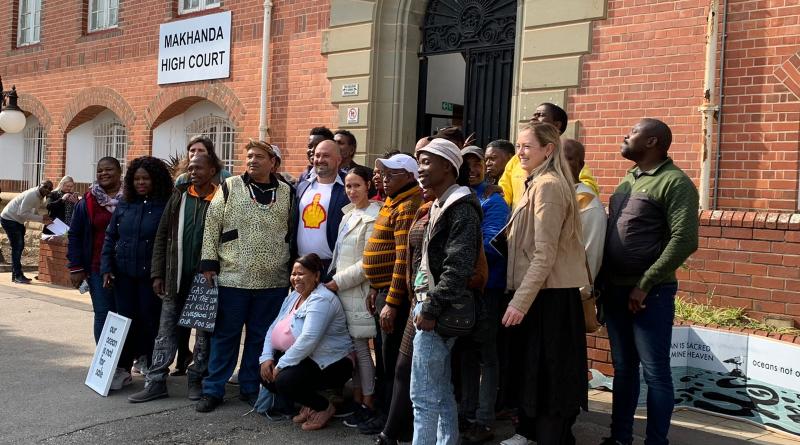Communities celebrate as Court sets aside Shell’s exploration right off the Wild Coast of South Africa

Makhanda, South Africa: Today, the High Court in Makhanda ruled that Shell’s exploration right to conduct seismic surveys on the Wild Coast of South Africa was granted unlawfully and therefore set it aside.
This judgment, written by Judge President Mbenenge, is a monumental victory for the planet, won by Wild Coast communities.
The court case was brought by Sustaining the Wild Coast NPC, Wild Coast communities, Wild Coast small-scale fishers and All Rise Attorneys for Climate and the Environment NPC, represented by the Legal Resources Centre (LRC) and Richard Spoor Attorneys.
Natural Justice and Greenpeace Africa applied to join the court case, and were represented by environmental law firm, Cullinans and Associates.
The case sought to review the decision by the Department of Mineral Resources and Energy to grant an exploration right to Shell and Impact Africa, allowing them to conduct seismic surveys off the Wild Coast of South Africa, in pursuit of oil and gas. The seismic surveys would involve a ship towing high-volume airguns which would blast low-frequency sounds at the seabed in regular intervals in order to map the seabed for oil and gas.
The applicants argued that the right should not have been granted on various grounds:
- That the exploration right was granted unlawfully since there was no consultation with affected communities and that the companies’ consultations with traditional leaders was insufficient.
- In awarding the exploration right, the decision-makers failed to consider the potential harm to the fishers’ livelihoods, the impact on their cultural and spiritual rights and the contribution of oil and gas exploitation to climate change.
- In awarding the exploration right, the decision-makers failed to consider the Integrated Coastal Management Act and its requirement to consider the interests of the entire community – including fishers and also ocean life.
Findings of the Makhanda High Court:
The court found in favour of the applicants on all the grounds of review.
On the issue of public participation, the court found that it was incorrect for consultations to only be conducted with kings, monarchs and other traditional leaders and that such an approach “finds no space in a constitutional democracy” (para 92) and further, that “a chief does not denote a community.” (para 93). “There is no law, and none was pointed to, authorising traditional authorities to represent their communities in consultations.” (para 92)
The judge went further to find that “…meaningful consultations consist not in the ticking of a checklist, but in engaging in a genuine, bona fide substantive two-way process aimed at achieving, as far as possible, consensus…” (para 95).
On the issue of harms to the environment, the court found that due to the apparent dispute between expert evidence on the harms of seismic testing to marine life, a precautionary approach should have been adopted by the decision-maker. This applies particularly when there is uncertainty and requires risk-aversion and caution to be taken.
Further, the judge acknowledged the key role of the ocean in the livelihoods and spiritual and cultural life of coastal communities. “The applicant communities contend that they bear duties and obligations relating to the sea and other common resources like our land and forests; it is incumbent on them to protect the natural resources, including the ocean, for present and future generations; the ocean is the sacred site where their ancestors live and so have a duty to ensure that their ancestors are not unnecessarily disturbed and that they are content.”
There is no evidence, said Mbenenge JP, that the decision-makers took the potential harm to these religious and ancestral beliefs and practices into account. That rendered the decision unlawful.
In relation to climate change as well as the issues of the right to food, the judge found that, had the Minister taken these issues into account, he may have found that the project was “neither needed nor desirable” (para 125).
The court found that the Integrated Coastal Management Act needed to be considered in the decision-making process, which “introduces an integrated approach to management and in this instance, the decision-maker did quite the opposite and dealt with the application as an energy-sector specific issue.” (para 130). The court found that the Minister was duty-bound to consider the ICMA and this in itself, means that the exploration right must be reviewed.
The court also found that the applicants did not have to lodge an internal appeal as required by the Promotion of Administrative Justice Act (PAJA), as the commencement of the seismic survey at the time of launching the application was imminent. Furthermore, the Minister of Mineral Resources and Energy, Gwede Mantashe, who had previously referred to any opposition to oil and gas developments as “colonialism and aparthied of a special type”, could not be said to have considered the internal appeal with an open mind and therefore the applicants’ perception of bias was warranted.
Additionally, the court found that the Minister could have simply abided by the decision of the court in relation to part A (the interdict which was granted by Judge Bloem in December 2021) but instead decided to pin his colours to Shell’s mast by refusing to review the exploration rights awarded to them and opposing the interdict in part A.
Notably, the judge stated that Shell’s Environmental Management Programme (EMPr) contained statements promising jobs and increased government revenue. However, these claims were not supported by evidence in the EMPr. In paragraph 135 of the judgment, the court found that there was no explanation as to how jobs would be created, “or how the seismic survey will improve the socio-economic circumstances in which most South Africans live”. This was particularly important as Shell argued that the applicant communities, who are poverty-stricken, would benefit economically from their oil and gas exploits.
On the joinder, the applicants, Natural Justice and Greenpeace Africa, were successful.
The respondents may now apply for leave to appeal the judgment to the Supreme Court of Appeal.
Quotes from the applicants
“Winning this means we are all moving towards an understanding that we need to find sustainable livelihoods; we need to move away from fossil fuels. This is for the good of everyone. Allowing Shell and the government to continue exploring for oil and gas and other fossil fuels would be detrimental to everybody’s lives and to the life of the planet. Winning means a sustainable life on this planet. A victory for the planet. Victory for future generations. It is not about us. We are in this fight for the good of the planet and the good of future generations.
The fight of coastal communities versus Shell is a struggle for environmental justice, for the protection of rural livelihoods, for sustainable development and for the life of the planet. Shell and the government are fighting for profit in the face of climate change that is putting the future of humanity at risk.”
- Sinegugu Zukulu, Sustaining the Wild Coast
“This victory is not just a victory for Wild Coast communities and making our voices heard. This is a victory against capitalist extraction and destruction of our future. This victory is not just about protecting the ocean upon which rural coastal communities depend. This is about protecting the planet and the whole of humanity.”
- – Nonhle Mbuthuma, Amadiba Crisis Committee
“As Wild Coast people, we live off the land and the ocean. Government tells us that oil and gas will bring job opportunities but we know very well that this will destroy our livelihoods. The ocean is our best defender against climate change, shielding us from its worst impacts. By helping the ocean we help ourselves. Ocean action is climate action.”
- Siyabonga Ndovela, Wild Coast resident
“These brave community members scored a very significant victory on behalf of rural people across the country who are dispossessed daily of their land and resources by the persistent practice of the State and companies who ignore them and speak only to their traditional leaders. There is no law that authorises chiefs and monarchs to do that and, in any event, the Court went on, there is no space in a constitutional democracy for such a top-down approach.”
- Wilmien Wicomb, Attorney, Legal Resources Centre
“Greenpeace Africa celebrates this decision to protect the Wild Coast from Shell’s destruction. It is proof that the world is moving into an era of social and environmental justice, where the voices of people are put before the profits of toxic fossil fuel companies.
There is still much work to be done to undo the destructive colonial legacy of extractivism in Africa, but this decision gives South Africans renewed hope that people’s lives and precious ecosystems are valuable and worthy of protection from climate criminals. The future is renewable!”
- Melita Steele, Interim Programme Director, Greenpeace Africa
“The victory in the Shell case is truly a victory for the people and planet. It sets an important precedent during this climate emergency. The court was clear that communities need to be properly consulted and that environmental impact assessments are critical. The cultural and spiritual connection to the land and ocean featured strongly in the judgment. This victory provides hope and momentum as people stand up across the planet. There are 148 oil and gas projects in the pipeline in Africa. This victory will ensure the tide turns.”
- Pooven Moodley, Director, Natural Justice
“The court’s decision today is a victory for all of us. This case was a case for all communities across the country. The proliferation of oil and gas exploration applications across South Africa’s shoreline does not bode well for our future, as the climate crisis requires us to stop all new fossil fuel projects.
This court victory shows that the fossil fuel companies are required to follow the law, include all affected people in public participation processes and consider all the harms to the environment. We are especially pleased by the Judge’s findings on meaningful public participation, that a monarch cannot represent communities in consultations about developments which affect their rights. With so many communities vulnerable to having their land and livelihoods impacted by fossil fuel developments, it is crucial that they are properly consulted. This judgment strengthens our law.
We want to acknowledge and thank our community representatives who have traveled the whole of yesterday to make it to the Makhanda court today – as they know how important this judgment will be for their communities – and for all of us.
The success of this case is based on the collaboration of many civil society organisations across South Africa and the world”
- Melissa Groenink-Groves, Programme Manager, Natural Justice



